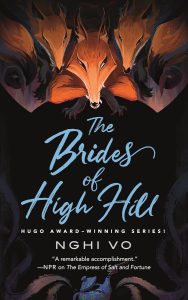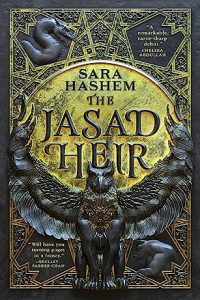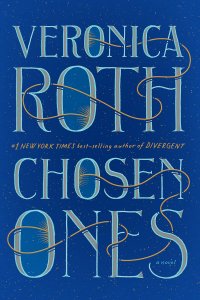Gary K. Wolfe Reviews The Brides of High Hill by Nghi Vo
 The Brides of High Hill, Nghi Vo (Tordotcom 9781250851444, $19.95, 128pp, tp) May 2024.
The Brides of High Hill, Nghi Vo (Tordotcom 9781250851444, $19.95, 128pp, tp) May 2024.
Over the past few years, Nghi Vo has parlayed the East and Southeast Asia-inspired world of her Singing Hills cycle into not only a delightful playground for the adventures of her itinerant Cleric Chih, whose ostensible mission is to collect stories for his monastery, but also into a kind of laboratory for storytelling itself. Earlier novellas have drawn on traditions that ranged from classic wuxia to the Arabian Nights to fellowship-on-a-quest tales, but the fifth volume, The Brides of High Hill, takes something of a different turn, with the nonbinary cleric taking a more active role in a darker tale with echoes of classic fairy tales, Victorian gothic, and even Get Out (in fact, Chih gets that exact warning fairly early on). This time, Chih, without their loyal companion and familiar Almost Brilliant (the sharp-tongued hoopoe from earlier tales), is accompanying the Pham family as they travel to a remote estate, Doi Cao, where their daughter Nhung is to be married, largely in hopes of improving their status and finances. But the estate, as impressive as it seems at first, turns out to be a forbidding, crumbling labyrinth, and red flags start popping up as soon as they arrive. The servants seem furtive and secretive, the nobles and guests at the welcoming banquet oddly silent, and the intended groom Lord Guo vaguely threat¬ening. The banquet is interrupted by a shouting, disheveled man who, Chih is later told, is the lord’s ‘‘mad son,’’ Guo Zhihao, living in enforced isola¬tion elsewhere on the estate.
While Chih has largely served as an observer and recorder in the earlier Singing Hills tales, here they are not only drawn into investigating the mysteries of Doi Cao, but are nearly infatuated with the spirited Nhung, and their amiable scenes early in the story are nothing less than charming. Together, they discover a long-abandoned library full of rotting books, and a night-time encounter with Guo Zhihao suggests that his own story may be more complicated than suspected. The real surprises are yet to come, of course, and in the tradition of classic mysteries, we eventually realize that the red flags we so proudly noticed may not have been the real red flags at all. Vo’s clever plotting requires a bit of narrative manipulation – it eventually becomes clear, for example, why the hyper-observant Almost Brilliant has to be kept offstage for most of the story – but the twisty rewards are easily worth it, as the later chapters slyly shift from mystery toward more traditional gothic horror, including a genuinely unsettling scene of a banquet full of rotten food and some unexpected transformations. But, even as it strays a bit from the stories-about-stories conventions of the earlier novellas, The Brides of High Hill serves to expand the possibilities of the Singing Hills saga, which reportedly has a couple of other volumes in the pipeline. Cleric Chih might not quite make it as an epic hero, but they aren’t that far removed from other flawed but shrewd ecumenical detectives like Father Brown, and they are more engaging and vulnerable here than ever before.
Gary K. Wolfe is Emeritus Professor of Humanities at Roosevelt University and a reviewer for Locus magazine since 1991. His reviews have been collected in Soundings (BSFA Award 2006; Hugo nominee), Bearings (Hugo nominee 2011), and Sightings (2011), and his Evaporating Genres: Essays on Fantastic Literature (Wesleyan) received the Locus Award in 2012. Earlier books include The Known and the Unknown: The Iconography of Science Fiction (Eaton Award, 1981), Harlan Ellison: The Edge of Forever (with Ellen Weil, 2002), and David Lindsay (1982). For the Library of America, he edited American Science Fiction: Nine Classic Novels of the 1950s in 2012, and a similar set for the 1960s. He has received the Pilgrim Award from the Science Fiction Research Association, the Distinguished Scholarship Award from the International Association for the Fantastic in the Arts, and a Special World Fantasy Award for criticism. His 24-lecture series How Great Science Fiction Works appeared from The Great Courses in 2016. He has received six Hugo nominations, two for his reviews collections and four for The Coode Street Podcast, which he has co-hosted with Jonathan Strahan for more than 300 episodes. He lives in Chicago.
This review and more like it in the May 2024 issue of Locus.
 While you are here, please take a moment to support Locus with a one-time or recurring donation. We rely on reader donations to keep the magazine and site going, and would like to keep the site paywall free, but WE NEED YOUR FINANCIAL SUPPORT to continue quality coverage of the science fiction and fantasy field.
While you are here, please take a moment to support Locus with a one-time or recurring donation. We rely on reader donations to keep the magazine and site going, and would like to keep the site paywall free, but WE NEED YOUR FINANCIAL SUPPORT to continue quality coverage of the science fiction and fantasy field.
©Locus Magazine. Copyrighted material may not be republished without permission of LSFF.







